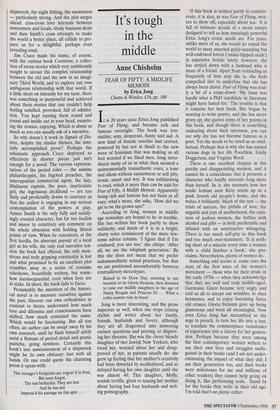It's tough in the middle
Anne Chisholm
FEAR OF FIFTY: A MIDLIFE MEMOIR by Erica Jong Chatto & Windus, £16, pp. 390 It is 20 years since Erica Jong published Fear of Flying, and became rich and famous overnight. The book was irre- sistible; sexy, desperate, funny and sad. A new kind of female novelist had arrived, powered by but not in thrall to the new wave of feminism that was making us all feel worried if we liked men. Jong intro- duced many of us to what then seemed a quintessentially transatlantic voice, a tone and idiom without earnestness or self pity, ironic, smart and wry. It was exhilarating to read, which is more than can be said for Fear of Fifty, A Midge Memoir. Apparently being rich and famous has not been at all easy; what's more, she asks, 'How did we get to be the grown-ups?' According to Jong, women in middle age nowadays are bound to be in trouble. She has written her book partly to show solidarity, and much of it is in a bright, chatty voice reminiscent of the more tire- some advice column. 'I figure that if I'm confused, you are too,' she chirps. 'After all, we are the whiplash generation.' By this she does not mean that we prefer sadomasochistic sexual practices, but that we are positioned uncomfortably between contradictory stereotypes.
Raised to be Doris Day, yearning in our twenties to be Gloria Steinem, then doomed to raise our midlife daughters in the age of Nancy Reagan and Princess Di . . . What a roller-coaster ride its been!
Jong is more interesting, and the prose improves as well, when she stops coining clichés and writes about her family, friends, husbands and lovers, although they are all dragooned into answering earnest questions and proving or disprov- ing her theories. She was the clever blonde daughter of two Jewish New Yorkers, who loved her, worried about her and disap- proved of her, as parents usually do; she grew up feeling that her mother's creativity had been thwarted by motherhood, and so delayed having her own daughter until she was almost 40. This daughter, Molly, sounds terrific, given to teasing her mother about having had four husbands and writ- ing pornography. If this-book is written partly to commis- erate, it is also, as was Fear of Flying, writ- ten to show off, especially about sex. It is full of intimate details of a moist nature designed to tell us how amazingly powerful Erica Jong's erotic needs are. For years, unlike most of us, she would jet round the world to meet assorted grisly-sounding but well-endowed lovers ('snake-hipped studs') in expensive hotels; lately, however, she has settled down with a husband who is more of a friend. Apart from reminding us frequently of how sexy she is, she feels compelled also to underline that she has always been clever. Fear of Flying was real- ly a bit of a come-down; 'My fame was hardly what a PhD candidate in literature might have lusted for.' The trouble is that it remains her best book. She began by wanting to write poetry, and she has never given up; she quotes some of her poems in this book, and though there is something endearing about their openness, you can see why she has not become famous as a poet. Yet she needs to be rated as an intel- lectual. Perhaps that is why she has named various dogs in her life Poochkin, Emily Doggerson, and Virginia Woof.
There is one excellent chapter in this patchy and disappointing memoir, and it cannot be a coincidence that it presents a character who briefly interests Jong more than herself. In it, she recounts how her senile lesbian aunt Kitty winds up in a posh Jewish old people's home, and she writes it brilliantly. Much of the rest — the trials of success, the pitfalls of love, the anguish and joys of motherhood, the catti- ness of jealous women, the battles with alcohol and pills — is both predictable and infused with an unattractive whingeing. There is too much self-pity in this book and too much over-statement. 'It is noth- ing short of a miracle every time a woman with a child finishes a book,' she pro- claims. Nevertheless, plenty of women do.
Something odd seems to come over the stars of the first wave of the women's movement — those who hit their stride in the early 1970s — when they acknowledge that they are well and truly middle-aged. Germaine Greer became very angry and told us all to accept our wrinkles, to shun hormones, and to enjoy becoming fierce old crones; Gloria Steinem gave up being glamorous and went all meaningful. Now even Erica Jong has succumbed to the urge to preach, to turn her life into a text, to translate the commonplace vicissitudes of experience into a theory for her genera- tion. Perhaps because they were among the first contemporary women writers to use their own lives and struggles undis- guised in their books (and I am not under- estimating the impact of what they did; I am their generation too, and their books were milestones for me and millions of other readers) they cannot help going on doing it, like performing seals. Stand by for the books they write in their old age: I'm told that's no picnic either.


























































 Previous page
Previous page